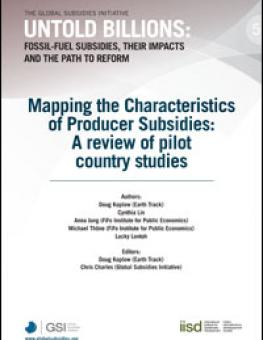
Mapping the Characteristics of Producer Subsidies: A review of pilot country studies
This paper reviews data sources for fossil-fuel subsidies in a series of countries with a range of differing governance systems, energy markets and stages of economic growth.
Using a detailed matrix setting out the main subsidy policies, the type of fuel and their main data sources, pilot studies have been completed for China, Germany, Indonesia and United States. The report begins to characterise the major subsidy types applied to fossil fuels and the current state of knowledge about each of these categories. The project team for each country evaluated commonly referenced data sources (e.g., databases collected by international bodies) and summarized how the information is gathered, with an important element of the research being an assessment of the data sources, including their strengths and limitations.
Papers in this series:
- Untold Billions: Fossil-fuel subsidies, their impacts and the path to reform: A Summary of Key Findings
- Effects of Fossil-Fuel Subsidy Reform: A review of modelling and empirical studies
- The Politics of Fossil-Fuel Subsidies
- Strategies for Reforming Fossil-Fuel Subsidies: Practical lessons from Ghana, France and Senegal
- Gaining Traction: The importance of transparency in accelerating the reform of fossil-fuel subsidies
- Mapping the Characteristics of Producer Subsidies: A review of pilot country studies
For information about the GSI's other reports on fossil-fuel subsidies, click here.
Participating experts
You might also be interested in
The State of BCAs 2025
As more countries boost their climate ambition, border carbon adjustments (BCAs) are emerging to curb carbon leakage, with the European Union, the United Kingdom, and others advancing their own mechanisms. This publication is the first of its kind taking stock of this trend.
February 2025 | Carbon Minefields Oil and Gas Exploration Monitor
In January 2025, 77 oil and gas exploration licences were awarded in seven different countries, with Norway leading in terms of embodied emissions.
Funding the Future
Practical recommendations for federal infrastructure programs with 14 criteria to better enable natural infrastructure in Canada.
Advancing Green Public Procurement in South Africa
This report analyzes practices and challenges of green public procurement in South Africa and provides recommendations for leveraging public spending to advance sustainability.